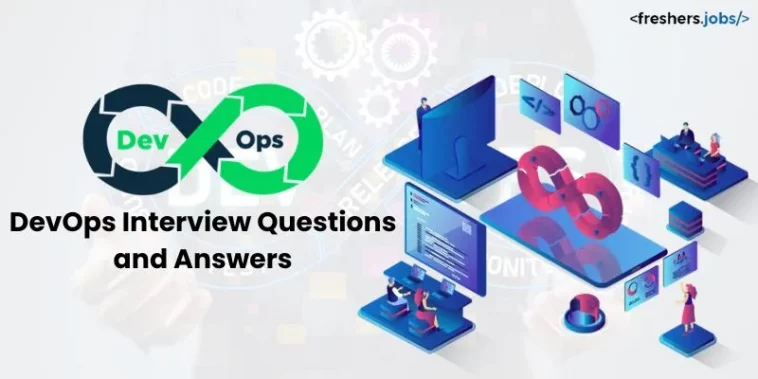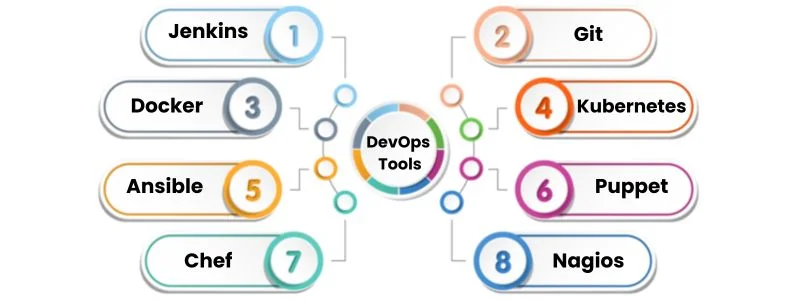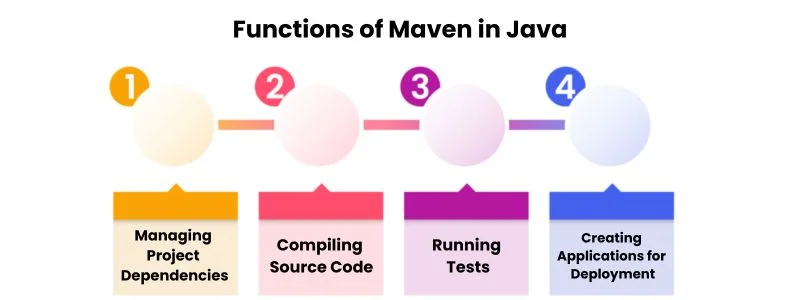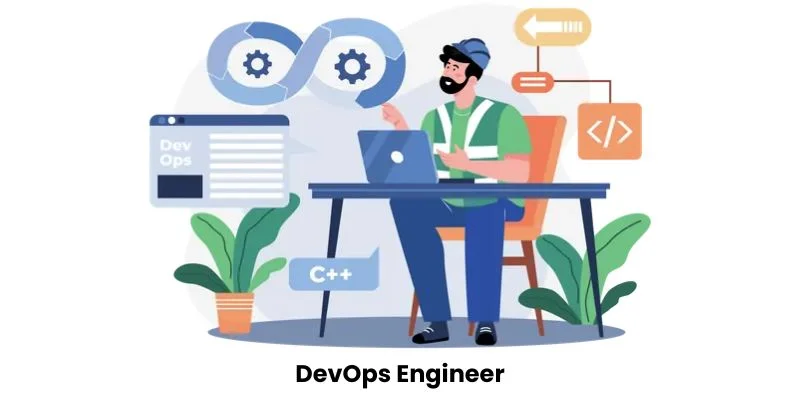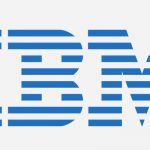DevOps is a set of practices that strives to convey the development(Dev) and the operations (Ops) teams and techniques closer collectively to deliver high-quality software program products in less time, with the help of diverse automation tools. It emphasizes CI/CD, automation of repetitive tasks, and introduces and manages the culture of collaboration and shared duty among all stakeholders inside the SDLC with an intention of making the development and deployment quicker.
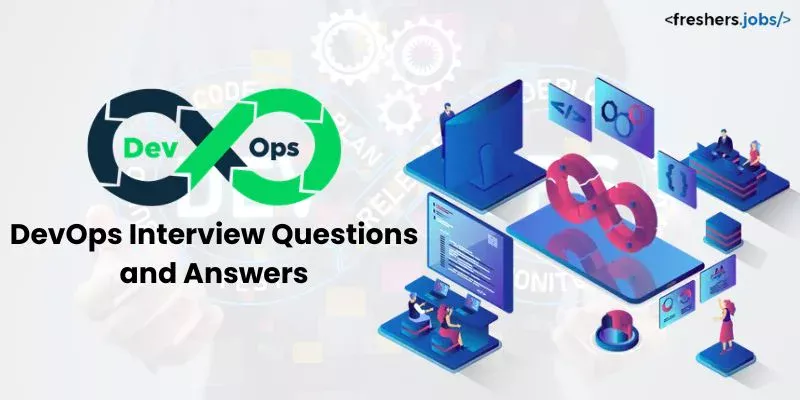
Freshers Jobs shared top 50 Devops Interview Questions and Answers on this blog which are tailored for freshers to confidently handle your DevOps Interview.
Devops Interview Questions and Answers for Freshers
We will be looking into the AWS, Python, Java, and PHP-Based Devops Interview Questions and Answers especially for freshers to help them tackle their DevOps Interview with confidence.
Devops Interview Questions and Answers
- What is DevOps?
DevOps is a method of development (Dev) or operations (Ops) in software development that results in minimized SDLC time and better quality of developed software.
- State the key principles of DevOps.
DevOps is a cultural change, with the aim of automation, based on the lean concepts, measurement and the share of the DevOps ideas and concepts which is shortly known as CALMS.
- What is continuous integration (CI)?
Continuous Integration (CI) is a systematic approach whereby many developers have interlinked their changes within the main source repository several times and integrated changes are often built and tested frequently.
- What is continuous delivery (CD)?
Continuous delivery, also abbreviated as CD, is a method wherein code updates are organized for the production environment to allow development & deployment of the software program product at any time.
- What are some popular DevOps tools?
Some common examples of DevOps tools are:
- Jenkins
- Git
- Docker
- Kubernetes
- Ansible
- Puppet
- Chef
- Nagios
Intermediate Devops Interview Questions and Answers:
- Define version control and describe why it is important in DevOps.
Version control is a system that provides the history of the change that occurs in files so that specific versions can be recalled later. It helps in maintaining the codes, in the implementation of collaboration practice, and in tracking changes in the codes.
- What is Docker?
Docker is a software platform, introduced for containerization that helps to run apps in portable containers to guarantee uniformity across various development deploying stages.
- What is Kubernetes?
Kubernetes is an open source Self-Containerised System to automate the deployment of applications implemented in containers to offer availability, scalability and maintenance.
- Define Infrastructure as Code (IaC).
Infrastructure as Code (IaC) is the technique of provisioning computing infrastructure via code & in preference to utilizing everyday IT techniques.
- Define microservices architecture.
Microservices architecture is an approach of designing the application that is based on using small and composed independent services that communicate with each other via APIs and are deployed independently.
Aws Devops Interview Questions and Answers
- What is AWS?
AWS is a cloud computing system, a suite of remote computing services, known as a Cloud Solution, that entails various services such as computing and storage service and other functionalities that are accessible over the web.
- What is AWS DevOps?
AWS DevOps involves the method, solutions, and procedures for adopting the collaborative and automating process of software development with IT operations in companies such as AWS continuous integration, continuous delivery, infrastructure as code, and monitoring tools.
- What is Amazon EC2?
Amazon EC2 is a computing service in the Amazon Web Services. It enables individuals to receive their own virtual server, create and implement security, and organize storage.
- What is AWS CodePipeline?
AWS CodePipeline is a form of Fully Managed Service within the AWS Cloud which is used to build and deploy Software functionality through continuous integration that tests and deploys in stages at remarkably high speeds.
- What is AWS CodeCommit?
AWS CodeCommit is a Source control service provided by AWS where entire teams can host Git Repositories and work on the code in a secure and scalable way.
Intermediate AWS Interview Questions and Answers for Devops:
- What is AWS CodeBuild?
AWS CodeBuild is a full-featured web service offering Continuous Integration that compiles source code, tests it and generates software packages that are ready for deployment.
- What is AWS CodeDeploy?
AWS CodeDeploy is a cloud service provider that simplifies the process of automating code to any instance, including Amazon EC2 instances, other instances promoting rapid & reliable application updates.
- What is AWS CloudFormation?
The AWS CloudFormation is a service that is used to model and deploy the AWS services as they allow users to spend much time in managing the services so as to develop apps.
- What is Amazon S3?
Amazon S3 is a web service that offers significantly high transference scalability of objects of any size, great data availability, security and endurance.
- What is AWS Lambda?
AWS Lambda is known as a serverless compute service which utilizes third-party apps and automatically begins with the right amount of resources required for running a particular code in response to specified events.
Python-Based Devops Interview Questions and Answers
- How is Python used in DevOps?
Python suits DevOps via its use in automation scripts, configuration management, infrastructure as code, and as a general-purpose programming language for advancing gear and applications.
- What are the blessings of the use of Python in DevOps?
Python gives simplicity, readability, extensive libraries, and sturdy community help, making it ideal for automation, scripting, and advancing DevOps tools.
- What is a Python script and the way is it utilized in DevOps?
A Python script is a record containing Python code that is meant to be performed directly. In DevOps, Python scripts are used for automation duties, which consist of provisioning infrastructure, configuring environments, and automating deployment techniques.
- What is Ansible and the way is Python utilized in it?
Ansible is an open-supply automation tool for configuration management, utility deployment, and task automation. Ansible playbooks are written in YAML, however the underlying modules and plugins are advanced in Python.
Intermediate Python-Based Devops Interview Questions and Answers:
- How do you install a Python package?
Python programs are installed utilizing pip, the Python package deal installer. For example: pip install package_name.
- What is a virtual environment in Python and why is it critical in DevOps?
A virtual environment is a separated Python environment that enables you to control dependencies for a specific assignment without affecting other projects. It guarantees consistency and avoids conflicts among dependencies.
- How do you create and set off a virtual environment in Python?
You can create a virtual environment utilizing python -m venv env_name and set off it using supply env_name/bin/prompt on Unix or env_name\Scripts\activate on Windows.
- What is requirements.txt and how is it used in Python tasks?
requirements.txt is a file that lists the dependencies of a Python assignment. It is used to install the desired packages using pip set up -r requirements.txt.
- Define Fabric and describe how it is utilized in DevOps.
Fabric is defined as a Python library for streamlining the use of SSH for application deployment or systems management tasks. It enables you to write Python scripts to automate deployment and configuration tasks.
- What is Jenkins and the way can Python be integrated with it?
Jenkins is an open-supply automation server for continuous integration and continuous delivery (CI/CD). Python can be included with Jenkins via scripts for building, test, and deployment automation.
Java-Based Devops Interview Questions and Answers for Freshers
- Explain how you can use Java in DevOps.
Java suits DevOps perfectly as a widely used programming language for advancing applications, in addition to writing build scripts, automated tests, and deployment tools.
- What are the benefits of the use of Java in DevOps?
Java gives platform independence, robust overall performance, large libraries, robust surroundings, and a massive network, making it ideal for constructing scalable and reliable programs in a DevOps environment.
- What is Jenkins and the way it is used in Java-based totally DevOps?
Jenkins is an open-supply automation server for CI/CD. In Java-based totally DevOps, Jenkins automates the build, test, and deployment procedures, making sure that code modifications are constantly included and delivered.
- How do you install a fundamental Jenkins task for a Java assignment?
To install a simple Jenkins process for a Java project, create a new job, configure the source code repository, specify the build triggers, and add build steps to compile the code, run tests, and package the software using tools like Maven or Gradle.
- What is Maven and the way is it applied in Java responsibilities?
Maven is a build automation & project management tool for projects in Java. It manages project dependencies, compiles source code, runs tests, and creates applications for deployment.
Intermediate Java-Based Devops Interview Questions and Answers for Freshers:
- What is Gradle and how is it extraordinary from Maven?
Gradle is a much greater flexible and faster build automation tool than Maven. It uses a Groovy-based DSL instead of XML for its configuration, permitting for more expressive and concise build scripts.
- What is Apache Tomcat and how is it utilized in Java-based totally DevOps?
Apache Tomcat is an open-source web server & servlet field for Java software application. It is utilized in Java-primarily based DevOps to install and run Java web programs in a production environment.
- What is Docker and how is it used with Java packages?
Docker is a platform for developing, transport, and running applications in containers. Java applications are containerized with the use of Docker to make certain consistency across exceptional environments and to simplify deployment and scaling.
- How do you deploy a Java application on Kubernetes?
You install Java software on Kubernetes by developing a Docker image, pushing it to a container registry, and defining Kubernetes deployment and provider YAML files to set up the application to the cluster.
- What is Spring Boot and how is it utilized in Java-primarily based DevOps?
Spring Boot is a framework for constructing Java-based totally, production-ready applications in less time. It simplifies dependency control and configuration, making it less complicated to expand and install microservices in a DevOps environment.
PHP-Based Devops Interview Questions and Answers
- How is PHP used in DevOps?
PHP in DevOps as an appreciably used scripting language for developing web applications that may be included into numerous DevOps tools and automation processes, testing, and deployment.
- What are the benefits of the use of PHP in DevOps?
PHP is easy to understand due to its nature, has fully detailed documentation, and massive community. The option is already ideal for web development because it can work with several databases and web servers simultaneously and without interference, which makes it a most desirable option for developing and deploying web programs in a DevOps setting.
- What is Composer and the way is it used in PHP tasks?
Composer is known as a dependency management tool for PHP. It permits developers to manage and install libraries and packages required for their projects, ensuring consistent and reproducible builds.
- What is PHPUnit and explain the way it is utilized in PHP projects?
PHPUnit is described as an unit testing framework for PHP. It is applied to jot down and run automatic tests to ensure the accuracy of code and to avoid regressions.
- Define Jenkins and explain how it is applied in PHP-based DevOps?
Jenkins extends as an open-source tool for CI/CD automation. In PHP-based DevOps, Jenkins helps in construct, test and to the delivery by moulding ongoing integration code changes.
Intermediate PHP-Based Devops Interview Questions and Answers:
- How do you set up a primary Jenkins process for a PHP challenge?
Create a new job in Jenkins, configure the source code repository, install build triggers, and upload build steps to put in dependencies, run tests, and install the software using appropriate tools.
- What is Docker and the way is it used with PHP applications?
PHP programs use Docker to ensure consistency across various environments and simplify deployment & scaling.
- What is Git and the way is it used in PHP-primarily based DevOps?
Git is known as a distributed version control system utilized to track in case of any modifications in source code. In PHP-based DevOps, Git is used to manage source code repositories, collaborate with team individuals, and combine with CI/CD pipelines.
- How do you clone a Git repository for a PHP venture?
It is possible to clone a Git repository by utilizing the following command:
git clone <repository_url>.
- What is a build artifact inside the context of PHP projects?
A build artifact is a file or set of files produced as a result of the construct procedure, together with compressed documents (ZIP, TAR) or Docker photos. These artifacts are deployed to run the software.
Career Prospects in DevOps
DevOps is a recent innovative approach in the Software Development process where developers and deployment operations teams in an IT organization collaborate and work together throughout the overall Software Development Life Cycle (SDLC). Prior to the integration of DevOps, IT companies often used the Waterfall or Siloed development methods, which extended the development cycle significantly. These methods made it difficult for the teams to collaborate and communicate effectively.
Are you looking for an extensive Devops Training Institute? Then you can explore the Top 10 DevOps Training Institutes in Chennai for more options.
The Siloed development approach results in chaos, confusion, and disputes between the teams during the SDLC, leading to delayed deployments. The lack of synchronization between the teams often delayed the product development cycle. Even when software was produced, it frequently contained errors or faults, failing to deliver fault-tolerant applications. The root cause of these issues was the need for more communication and collaboration within the organization.
Recognizing the growing demand for quality software products within shorter timeframes, prominent organizations realized that traditional practices were inadequate. They adopted DevOps practices to accelerate business growth. Globally, organizations like Amazon, Google, Accenture, Microsoft, Apple, TCS, and Intel implement DevOps methodologies that were able to eliminate the cumbersome, stereotypical processes of traditional practices and produce software products much more quickly. Given below are the job opportunities available in the DevOps field.
Entry-Level DevOps Engineer
A Junior DevOps Engineer will work on learning fundamental DevOps principles: like writing automated scripts, CI/CD pipeline execution, managing the development environment, etc This job will be suitable for freshers or other IT professionals who want to shift from other roles. The approximate income for Junior DevOps Engineers role ranges from $60,000 to $80,000 per year.
DevOps Engineer
A DevOps Engineer will be in charge of pipelines of CI/CD and ensure automation in infrastructure and monitoring systems. They also have to take care of the scalability and reliability of the application. This role works close to development and Operation teams, integrating and deploying changes of code. A good knowledge base of various tools and practices of DevOps is necessary. Salary packages offered to freshers as DevOps Engineers ranges between 90,000 to 1,20,000/- per annum.
Senior DevOps Engineer
A Senior DevOps Engineer will work on more complicated tasks, for example to design an advanced CI/CD pipelines, establish high-power security measures, provide assistance in cloud infrastructure optimization, as well as support junior team members. They can be involved as active participants in the decision-making process at the strategic management level and be in-charge for increasing the efficiency of the development. These jobs are among the highest paid in this IT branch, with the average annual wage falling within $120, 000 to $ 150, 000.
DevOps Architect
A DevOps Architect designs an organization’s DevOps strategy, works on scalable and secure infrastructure, integration of tools and technologies, and best practices. The role requires both deep technical performance expertise and strategic planning. The approximate income for the DevOps Architect role starts from $140,000 to $180,000 per year. Looking for DevOps Architect job vacancies in Coimbatore? Explore Fresher Jobs in Coimbatore.
DevOps Manager
The DevOps manager monitors the DevOps team performances and operations, so they make sure that everything works well. They ensure that they manage projects, interface with other departments and also perform other administrative roles that affect DevOps processes. Technical & managerial expertise are very important for this position. The approximate income for this position starts from $130, 000 and $170,000 yearly.
Director of DevOps
A Director of DevOps leads the entire DevOps strategy for the companies. They will have overall responsibility for their alignment with the business goals, for managing big teams, and for ensuring continuous improvement of the process. This requires an extended experience in DevOps and leadership. Average income of a Director of Devops starts from $160,000 to $200,000 per year.
Chief DevOps Officer (CDO)
The Chief DevOps Officer is basically a top executive who is responsible for the visioning of DevOps overall and strategy within the organization. The officer partners directly with other C-level executives to ensure that the practices of DevOps are linked with the business objectives and technological goals of the company. They must have an excellent knowledge of the business & technology elements of DevOps. The salary of a CDO can start from $200,000 to $250,000 yearly.
In the modern-business world, the demand for DevOps professionals is increasing rapidly. Organizations across the globe are spotting the big benefits of adopting DevOps practices, from multiplied product improvement cycles to more advantageous collaboration between development and operations groups. This surge in demand translates to diverse career opportunities for freshers eager to enter the DevOps realm. If you are looking for DevOps-related Job opportunities, you can visit Free Alert Job for better options.
The journey to becoming a DevOps expert begins with gaining knowledge of fundamental concepts and practices. The top 50 DevOps Interview Questions and Answers for Freshers offer a comprehensive guide to understanding the ideal concepts of DevOps, preparing you to address the challenges and grab the opportunities that lie beforehand. As the enterprise keeps adapting, staying up to date with the contemporary tendencies and tools in DevOps may be crucial for your profession to increase.

